|
|
|
Sort Order |
|
|
|
Items / Page
|
|
|
|
|
|
|
| Srl | Item |
| 1 |
ID:
153661
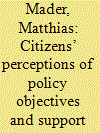

|
|
|
|
|
| Summary/Abstract |
This article is concerned with the role of perceived policy objectives in German citizens’ attitude formation toward military action in Afghanistan. While some scholars have claimed that public opinion is prudent because citizens assess the effectiveness of a mission on the basis of these perceptions, micro-level tests of this kind of prudence remain scare. Drawing on two cross-sectional surveys of the German population conducted in 2008 and 2009, we use responses to open-ended questions about the German government’s policy goals in Afghanistan to analyze whether such perceptions influenced support and whether any such influence was mediated via the perceived effectiveness of the mission. The results indicate that, irrespective of the level of political awareness, it was virtually irrelevant what German citizens perceived the military mission’s objectives to be. In contrast, value-based attitude formation emerges as more important, with the foreign policy predispositions antimilitarism and Atlanticism exhibiting especially large effects.
|
|
|
|
|
|
|
|
|
|
|
|
|
|
|
|
| 2 |
ID:
153660
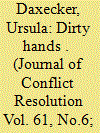

|
|
|
|
|
| Summary/Abstract |
Existing research suggests that the use of harsh repression can exacerbate the incidence and duration of terrorism. Micro- and macro-level analyses have shown that coercive government responses to terrorism can radicalize sympathizers, increase recruitment, and undermine community support for counterterrorism policies, leading to backlash and increased terrorist activity. Focusing on torture techniques, this article aims to establish mechanisms implicit in the backlash hypothesis. These arguments imply that information about government transgressions is available to potential group sympathizers, but have not examined whether and how variation in the visibility of different torture techniques affects the likelihood of backlash. Scarring torture, a technique that is both more visible and less plausibly deniable than other forms of torture, is expected to produce higher volumes of terrorism. Using disaggregated data on allegations of torture from the Ill-Treatment and Torture project for 1995 to 2005, the analysis shows that scarring torture is consistently associated with increases in terrorism, whereas stealth torture has no statistically discernable effect on terrorism.
|
|
|
|
|
|
|
|
|
|
|
|
|
|
|
|
| 3 |
ID:
153656


|
|
|
|
|
| Summary/Abstract |
While some borders are real firewalls against conflicts, others appear like tinder just waiting for the smallest spark. Only recently has research focused on the transnational perspective of conflict and current research has focused mostly on isolated aspects of this phenomenon. In this article, we provide a unified framework for conflict contagion that takes into account receiver, sender, dyad, and network effects. This is a novel perspective on conflict contagion, and our empirical results suggest that distinguishing between sender and receiver effects allows for a better understanding of spillover effects. We provide insights that especially excluded ethnic groups impact the risk of countries sending and receiving conflicts from its neighbors.
|
|
|
|
|
|
|
|
|
|
|
|
|
|
|
|
| 4 |
ID:
153658
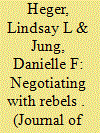

|
|
|
|
|
| Summary/Abstract |
When rebels provide social services, do they have more leverage negotiating the terms of a peace deal? The literature suggests service-providing groups may, on average, have a wider base of support and a more centralized organizational structure. We argue that these features deter potential spoilers from breaking away from the organization during negotiation processes. This, in turn, makes governments more willing to enter negotiations since the threat from spoilers is smaller. Thus, compared to nonproviders, service-providing rebels are more likely to engage in negotiations and these processes are likely to be more stable. This article analyzes these propositions by gathering service provision data on nearly 400 rebel groups and their involvement in and behavior during peace talks. It also serves as an introduction to a larger project about the implications of rebel service provision on conflict outcomes.
|
|
|
|
|
|
|
|
|
|
|
|
|
|
|
|
| 5 |
ID:
153657


|
|
|
|
|
| Summary/Abstract |
Many studies highlight the role that international intervention can play in prolonging civil wars. Yet, direct military intervention is just one way that external actors become involved in civil conflicts. In this article, a model is developed and analyzed that shows that when the government is unsure about how external support to the rebels will help rebel war-making capacity, it is the government that will continue fighting rather than settle the dispute. Different types of external support to rebels influence their fighting capacity differently, and some types of support create uncertainty about how new resources will translate into war-making ability. Specifically, more fungible sources of support (such as direct financial support) generate the most uncertainty for states as they attempt to estimate the effect of support to rebels on the conflict. Increased uncertainty inhibits bargained settlement, and disputes characterized by fungible external support are less likely to end than those where rebels receive different kinds of support. Empirical analyses demonstrate strong support for this argument; rebels that receive highly fungible external support (money and guns) are less likely to see conflict termination than rebels that do not.
|
|
|
|
|
|
|
|
|
|
|
|
|
|
|
|
| 6 |
ID:
153662
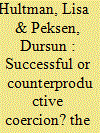

|
|
|
|
|
| Summary/Abstract |
Despite the frequent use of economic and military-specific sanctions against countries affected by civil conflicts, little is known about the possible impact that these coercive tools have on conflict dynamics. This article examines how threats and imposition of international sanctions affect the intensity of civil conflict violence. We formulate and test two competing views on the possible effect of economic and military-specific sanctions on conflict dynamics by combining data on fatalities in battle-related violence in all internal armed conflicts in Africa from 1989 to 2005 with data on economic sanctions and arms embargoes. The results indicate that threats of economic sanction and arms embargo are likely to increase the intensity of conflict violence. Similarly, imposed economic sanctions are likely to contribute to the escalation of conflict violence. Imposed arms embargoes, on the other hand, are likely to reduce conflict violence. We conclude that international sanctions appear to be counterproductive policy tools in mitigating the human cost of civil conflicts unless they are in the form of imposed arms embargoes attempting to limit the military capacity of the warring parties.
|
|
|
|
|
|
|
|
|
|
|
|
|
|
|
|
| 7 |
ID:
153659
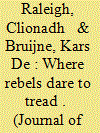

|
|
|
|
|
| Summary/Abstract |
This analysis illustrates how violence patterns are shaped by local power concentrations. Disaggregated conflict analysis has led to major advances into understanding conflict trends, agents, and dynamics of violence but has not been matched by studies of disaggregated politics, in particular on the subnational level. This analysis details how conflict event location, frequency, and intensity is largely determined by levels of customary authority and development; while armed group bases and control networks are established in areas characterized by weak, co-opted local authorities, wealth generation possibilities, and proximity to other network nodes. This demonstrates that dominant opposition groups co-opt local elites and target those who cannot be easily co-opted or belong to alternative networks. Manifestations of conflict are therefore not well explained by the typically static resource, poverty, or state capacity measures. Local politics and customary authority determine where government, rebels, and militias dare to tread. Sierra Leone Local–Location Event Dataset—a new disaggregated data set on the Sierra Leone war and local source feature of Armed Conflict Location and Event Data—provides substantial evidence for our subnational conflict explanations.
|
|
|
|
|
|
|
|
|
|
|
|
|
|
|
|
|
|
|
|
|